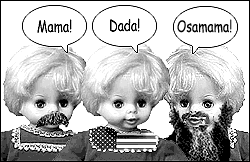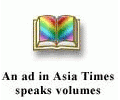| |
COMMENTARY
Press the
patriotism button, baby
By Sreeram Chaulia
 In George W Bush's America, it is the season for
political dolls to again become big hits with
shoppers, reminding toy market analysts of the
Saddam Hussein "action figures" that
stole the Christmas sales in the winter of
1990-91. A small firm in the state of
Connecticut, Herobuilders Inc, is raking in
fabulous profits generated by unique 12-inch
talking world figures that utter politically
correct dialogues when the button on their heads
is pressed.
In George W Bush's America, it is the season for
political dolls to again become big hits with
shoppers, reminding toy market analysts of the
Saddam Hussein "action figures" that
stole the Christmas sales in the winter of
1990-91. A small firm in the state of
Connecticut, Herobuilders Inc, is raking in
fabulous profits generated by unique 12-inch
talking world figures that utter politically
correct dialogues when the button on their heads
is pressed.
Iraqi leader Saddam Hussein comes wrapped in a
pocket-sized sado-masochistic outfit, holding
nukes and germs in either hand, threatening to
blow up the "free world". Herobuilders'
figure of the US president, spouting 17
tough-talking Bushisms, sold out its inventory
of 50,000 dolls in less than a week in early
December 2002. Among the doll's aphorisms are
Bush's landmark declaration made at Ground Zero
in New York after the twin World Trade Center
towers were destroyed, "The people who
knocked down these buildings will hear all of us
soon." This dialogue is followed by raucous
background cheering of construction workers and
rescuers: "USA! USA! USA!"
The piece de resistance of Herobuilders'
repertoire is the talking doll of Osama bin
Laden, costing US$36. Press down on his white
turban and he squeaks in a rather Yankee-doodle
style, "I suck! Would you stop bombing me?
You're killing me. I suck! My turban is too
tight, I made a big mistake, all jihad go home.
I was just kidding. I suck. Oohoohoohoohoo!"
Toyshops claim that this doll has beaten all
previous action figure sales records and that
makers are planning a second version programmed
with even more funny quotes from the sheikh.
Toys of British Prime Minister Tony Blair and
former New York mayor Rudolph Giuliani are
struggling to compete with this all-star lineup,
but they, too, have interesting comments to
make. Blair convinces buyers that it is in the
"interests of world peace that Saddam is
disarmed". Giuliani praises the
"spirit of New York which can never be
cowed down by mad terrorists".
What is to be made of all this? One way of
looking at the phenomenon is to argue that
Americans are a very informal, sporty people and
enjoy spoofs of politics and politicians.
Ever-popular WWF wrestlers mimic the president
and wear underwear with the stars-and-stripes on
it. "Dubyaman" comics and pictures of
Bush reading "Presidency for Dummies"
circulate with rapidity. Talk show comedians
come on television and rubbish Kim Jong-il as a
dissolute dimwit. Irreverence and casualness,
according to this line of thought, is endemic to
the American way of life and no icon is too big
to be spared some debunking in popular culture.
The alternative view, which I hold, is that
Herobuilders company is nicely buttressing the
Bush doctrine of preemptive war to "extend
the benefits of freedom across the world".
(See The National Security Strategy of the
United States of America, September 2002). When
legendary trainer Nick Bollettieri was asked the
secret of America's monopoly of world tennis
champions, he replied, "We catch them
young." Political dolls do a similar
service - they capture and color the psychology
of American youth at a formative and
impressionistic age. The norms and ideas the
Bush, Saddam and bin Laden dolls impart are far
more effective than what children learn in
school textbooks.
As subtle carriers of propaganda, a-la James
Bond films during the Cold War, the dolls help
shape a new generation of proud, nationalistic
and president-saluting citizens. They sow the
seeds of a peculiar American morality whose
first canon is "we" are good and
"they" ("Russkies",
"commies" or "jhadis") are
evil. The simplistic dichotomy of good against
evil, which the Bush doctrine reiterates, does
not raise eyebrows in average American homes,
thanks to the groundwork laid by action figures
and Superman cartoons. It is the same spadework
that results in a singularly American trait:
"flag patriotism", which far
supersedes the occasional underwear buffoonery
of wrestlers. In no other country does one get
to see the national flag so profusely exhibited
in front of homesteads, on motor vehicles, in
shopping malls and on school bags of tiny tots.
These visual symbols collectively assist in
inculcating the unquestioning sense of loyalty
toward a regime that is waging war after war
after war. Latest opinion polls conducted
earlier this month reveal that 87 percent of
Americans consider Iraq a "threat to
national security". That such an
overwhelming majority has bought the Bush line -
without conducting any objective analysis or
common sense thinking - is living proof that the
business of "getting folks to rally behind
the flag" is roaring in America.
Noted historian Tariq Ali has likened Bush's
Americanism to another form of religious
fundamentalism that thrives on whitewashing
domination, manipulation and extermination, and
relying on the good-evil paradigm to prepare
domestic constituencies for foreign
misdemeanors. Taboo questions that are not
encouraged in this "religion" range
from "Why are we going after some evil, and
ignoring or mollycoddling other evil?" and
"Did you know that the US air force used
chemical and biological weapons extensively in
the Korean War?" to "Why do we
spuriously parrot that our actions always defend
democracy and liberate oppressed people when we
know that it is a lie?"
The most that adherents of this religion are
willing to acknowledge, as the character named
"Control" does to Richard Burton in
the classic Cold War flick The Spy Who Came
in From the Cold, is that "we"
sometimes use "evil methods" to
counter evil, thereby preserving good in the
end.
A tiny segment of American civil society,
located in university campuses, church dioceses
and human rights organizations, is without doubt
vibrant and vigilant, organizing peace marches
and asking the taboo questions. But their
efforts are largely met with apathy, or worse,
antipathy from the mainstream. Last month, I
marched in a peace rally in Syracuse, a small
New York town, and found to my consternation
that the 50-odd banners we planted on the grass
along pavements near the city center were
crossed out with red paint the morning after the
demonstration.
Our script had read "No blood for oil in
Iraq". In red sanguine-looking paint,
someone had retorted: "Be American. God
Bless." Only a religion, thoroughly
internalized, can propel citizens to brave the
cold of snowy nights simply to overwrite a few
taboo questions on innocuous placards. Here was
a first-rate illustration of Tariq Ali's
"clash of fundamentalisms".
In 1988, John Mackenzie published Propaganda
and Empire. The Manipulation of British Public
Opinion, a remarkable history of ideas and
norms that formed the societal consensus behind
the last round of British worldwide
expansionism. Glorification of martial virtues
and the persona of Queen Victoria, backed by
misinformation about the civilizing mission of
colonizers like Cecil Rhodes, spread to all
layers of British society from the 1880s onward.
Textbooks, imaginative brochures, advertising,
theater, radio and institutions like the Boy
Scouts were used by the crown to trumpet the
"liberation" (more accurately, the
selective genocide) of the "heathen
lands". No room was left for doubt whether
the colonial project was causing irreparable
human and psychological damage to the subject
peoples.
The air in America these days is a lot similar.
The Cold War ended de jure in 1991, but the
glory and religious fervor of unipolar empire is
sinking in only after September 11. More and
more common citizens are getting touchy about
"pacifists" who oppose the Bush
doctrine. More and more school kids are punching
the plastic helmet on Herobuilders' Saddam
Hussein toy to hear the Iraqi dictator guffaw
and warn, "America, I'm coming for you with
all my germs." More and more children,
asked what they want to be when they grow up,
say "Real American Hero".
(©2003 Asia Times Online Co, Ltd. All rights
reserved. Please contact [email protected]
for information on our sales and syndication
policies, or to submit a letter to the editor.) |
| |
|
|
 |
|




 In George W Bush's America, it is the season for
political dolls to again become big hits with
shoppers, reminding toy market analysts of the
Saddam Hussein "action figures" that
stole the Christmas sales in the winter of
1990-91. A small firm in the state of
Connecticut, Herobuilders Inc, is raking in
fabulous profits generated by unique 12-inch
talking world figures that utter politically
correct dialogues when the button on their heads
is pressed.
In George W Bush's America, it is the season for
political dolls to again become big hits with
shoppers, reminding toy market analysts of the
Saddam Hussein "action figures" that
stole the Christmas sales in the winter of
1990-91. A small firm in the state of
Connecticut, Herobuilders Inc, is raking in
fabulous profits generated by unique 12-inch
talking world figures that utter politically
correct dialogues when the button on their heads
is pressed.


